 Tosca Lee is the author of the ground breaking novels Demon: A Memoir and Havah: The Story of Eve. We were blessed to have Tosca answer questions posed to her by my Book Club members in time for us to read at our discussion of Havah, last Friday night.
Tosca Lee is the author of the ground breaking novels Demon: A Memoir and Havah: The Story of Eve. We were blessed to have Tosca answer questions posed to her by my Book Club members in time for us to read at our discussion of Havah, last Friday night.
I am now delighted to share our Q&A with Tosca here at Relz Reviewz.
Thanks, Tosca:~
Questions on Havah….
How long did it take to research and write this book and how was it challenging for you?
It took me about six months to research it and about six to write it. The tough part was when I finally realized what I had gotten myself into; halfway through I realized I needed to know not only about the scriptures, but something about ancient textiles, pottery, basket-weaving–even simple fire-making. And that I kne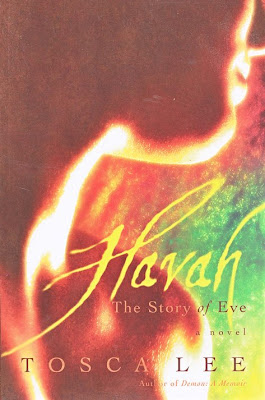 w nothing about pregnancy or child birth or wolves or other animals… birds, plants and foods indigenous to the Iraq/Turkey area… By the time I realized all this, I was ready to crawl into a hole.
w nothing about pregnancy or child birth or wolves or other animals… birds, plants and foods indigenous to the Iraq/Turkey area… By the time I realized all this, I was ready to crawl into a hole.
Did you characterise some of the persons in the book after people you know?
Haha! The parts where Havah is struggling in her relationship with Adam are modelled after some of my experience from my marriage, and Adam bears a resemblance in some parts of the story to my former husband. Especially the snoring part. And her attacking him for it. Snoring just drives me crazy.
How did you come by your description of the serpent?
I knew the serpent had to be something special, and that it had to have legs or wings or both before the fall. So I was thinking something bird-like, but birds are also rather reptilian, too. I liked the idea of it shimmering because I wanted it to be bright, as Lucifer is said to be in the references to him as a star or masquerading as an angel of light. Because I characterized Lucifer as drop-dead gorgeous in Demon, it made sense to me that he would want to inhabit or be personified by something beautiful. More notes on Lucifer in the back of Demon if you’re interested.
It was interesting that you described a storm as Adam & Eve left the garden – I had heard that the rains that bought the flood in Noah’s day were the first God sent. Is that incorrect?
The vapour canopy theory has lost some popularity with physicists and scientists the last couple decades. The Bible only tells us that before there was man, there was mist because there was no one to work the garden. So the question of rain was up in the air for me. After consulting physicist friends and learning about some of the complications surroundingthe vapour canopy theory (namely having to do with air pressure and temperature), I leaned in favour of having rain and storms.
I read your description of the fallen angels being jealous of God’s people and he way we so often take his unconditional love for granted in Rel’s spotlight of your book Demon: A Memoir and felt that you also brought this out very well in the dialogue between the serpent and Havah in this book.
This really got me thinking about Satan being jealous of us and was wondering if this was your intention. I also was very intrigued with your take on Havah’s strong feelings of betrayal when Adam blamed her for his part in eating the forbidden fruit and how this appears to be the main reason for the decline in their relationship. Am I reading into this correctly? 
The jealousy thing didn’t occur to me as a reason to write–but it did come up when I was first contemplating what a real demon might truly feel toward humans. Why would they want humans to fail? Comic book demons seem to do it for fun, or just to be pesky. But what’s the motivation of real demons? I had a hard time imagining that they were evil by nature because they don’t seem to have been evil before they fell. So something had to happen in their hearts. Of course, spirit beings don’t function the way humans do, but speculating from a human standpoint, this was my closest approximation. J
I think the main reason for the decline in Havah and Adam’s relationship is that they had fallen–they were no longer innocent. They went from a perfect relationship to an imperfect one… and out of that fall came blame. So the blame caused a toxic reaction, but the real reason for their troubles was their own human and fallen state.
Did you use a significant place (from any travels) for the Garden of Eden?
When I was researching the Havah book, I went to St. Lucia (my travel blogs are online if you go to toscamoon.blogspot.com and then click on the link for my Hundred Thousand Miles travelogues, on the right margin). The bugs there at night were positively musical. So that was one inspiration.
Why did you decide to give God and the adam blue eyes?
Adam was the one with blue eyes… I think because I liked the idea of giving him some ambiguous racial identity: darker skin, but blue eyes (which is rare, but not impossible). I just didn’t want to end up with these two pink, blonde naked people like you see on the Sunday school flannel graph boards.
Was it difficult to come up with so many names for the children of the adam and Havah?
Yes. But at times I knew sort of the sound I wanted. And I did find it interesting looking for more obscure names in my Hebrew baby book that had meaning to the character in the story. All of the character’s name have significance.
What aspects of your faith were challenged and strengthened because of the writing of this novel?
This novel was such a challenge. I just felt downtrodden a lot while I was working on it, and so worried I was going to let everyone down. As Demon continued to do well, I just got more fearful. Somewhere in the thick of it, I went to this new (Christian) chiropractor and he said, “Can I pray for you?” Well, I just started bawling. He said, “God is happy with the work you’re doing. You’re a song in his heart.” I bawled more. The thought that God could be happy at all with me, or could recognize me (I know it’s stupid, of course He does) was somehow miraculous.
Were there times when melding fictitious detail with biblical fact was difficult? How did you work through those challenges to come to a solution you were at peace with?
Yes, many. Trying to come up with the mark of Cain, for instance, was difficult. In the end, I just try to look at all the scripture and the few facts available, and try to explain it to myself in a way that makes sense. A lot of what I do in my writing is to try to make sense of things for myself.
What was the most enjoyable scene to write, and the most difficult?
The scenes where Havah proclaims who she is. When she talks about her name after Adam names her. I really dug that. And I loved the end. The hard parts were everything else–and getting the bird sounds or geography or plant things or animal things right. Just looking stuff up continually. And trying to describe her relationship with God pre-fall. That was tough.
Was it intended that this story should add to our understanding of who God is and how He worked out His purposes in the very beginning? If not, what was the purpose in writing this story?
I really wanted to put some flesh around Eve, to make her someone recognizable and human–to highlight the ways that she is like us… and the ways her experience are like nothing we will ever be able to identify with. I also wanted to examine what it might have been like, to have faced the choices and the heartbreak that she did. I don’t know about you, but when I used to think about Eve, I always thought of her as a little naïve and sort of ditzy, frankly. But realistically, a historical Eve would have had to be the smartest, most physically perfect woman ever created. What a life, to have walked with God… and to have lost that fellowship as she knew it! I wanted to highlight that I really believe any one of us could have made the same mistakes, even with the best of intentions, as I believe we do every day.
I also wanted to set the stage for the hope of a future–the groundwork of God’s plan in providing a Messiah, of making something good and eventually fulfilled come out of even tragedy and error.
Right from the beginning Havah is amazed at the beauty of the serpent and is captivated by his words to her, almost ensuring she is unable to resist his ‘fatal attraction.’ How did you decide that the concept of the serpent’s very nature and beauty would pull Havah consistently towards him so she would become enraptured with him, and his words, and not just the fact that she desired something that she was forbidden to take by God?
Well, I always figured that there had to be something special about the serpent to get such an intelligent woman who knew God first-hand to want to listen to him. She was beguiled, the scriptures say… so what was it about him, exactly? He was so smart, he seemed credible… and he didn’t lie, per se–he just didn’t tell full truths. If we equate the serpent to Satan, then we know that Satan had at one point done the same with the angels before a third of them fell–that he managed to convince many of them to believe and follow him. So this is a very crafty, very persuasive–and very gorgeous–being. He was the most perfect creature under God at one point, as weird as that sounds.
From the beginning of her creation the Adam regards Havah as his equal in every way. After they have taken the fruit and flee the garden he gradually then appears to lose all respect of her opinions and of Havah as a person, isolating himself from her in many ways. At what point do you feel the impact of sin on man’s understanding of a woman deteriorated resulting in the crisis of relationship that appears in this story and which we see so strongly in our society today?
That is a good question. If we look at what God says to Eve, regarding the fact that Adam will rule over her, some regard those words as less a curse than simply matter-of-fact prophesy. The egalitarian nature of the garden has given way to a model that was not the original design. Left to my own conjecture, I would think that this power struggle would have its roots about where it did in the story: soon after realization of what happened… to be played throughout history in the evolving roles of man and woman in a growing population.
What type of research did you do for this book?
See above – The list of research still gives me post-traumatic stress just thinking about it. 😀
How did you develop the characterisation of Eve?
I pretty much tried to think through each of the situations Eve would experience for the first time and tried to think of my own response. To me, characterization is a lot of role-playing, a lot of time spent imagining the “what ifs” of a character’s thought life and experience. The fact that I was married for 14 years helped me a lot with some of the relational rubs and issues, if only because I imagine that there are few relationship issues that are truly unique to any one couple.
Why didn’t you have the name Abel as the traditional name of Havah’s second eldest son?
Good question, and one I forget to explain: I wanted to use the traditional Hebrew, nontransliterated names for Eve, Cain, and Abel, and Seth, etc. It seemed somehow more organic to keep them in the Hebrew and not use the English versions–also to help get away from the standard images that arise when we hear “Adam and Eve” or “Cain and Abel.”
I thoroughly enjoyed having the poems scattered throughout the book. Did you write these poems as the story unfolded or were they from a time that you thought would be perfect for the book?
I did them as the story was unfolding.
I didn’t like how you would interchange the use of ‘God’ & ‘The One Who Is’ throughout the book (though I recognise you didn’t do it much). Could you help me understand why you did this? By the way, I thought ‘The One Who Is’ as a name for God was really cool, it was helpful in entering that period of history.
There were times when, telling the story as an old woman about to die after 900-some years, it seemed to me only natural that Eve should have some name for God that was more like “God”… evolved from the time when all they knew him as was “The One that Is.” I like The One That Is better, myself, but it was getting cumbersome and I thought, if it was getting cumbersome for me… at some point she must have had another nam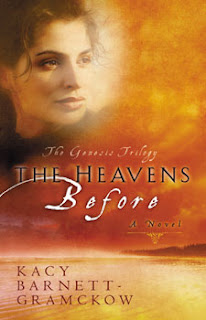 e or word for God, herself. J I did slip Adonai in there, too, once–but there were just times “God” seemed to detract from the flow of the narrative less.
e or word for God, herself. J I did slip Adonai in there, too, once–but there were just times “God” seemed to detract from the flow of the narrative less.
So are you going to write a book continuing on the story with a plot surrounding the tower of Babel? I think you could pull it off.
No plans for that right now, though my friend Kacy Barnett-Gramckow did one about that. Definitely check her books out!
How long was your preparation and research before you actually started writing the book?
Including or not including all my procrastination time? J Overall the research was about six months and six months writing (this is in between working at my consulting job, which has me traveling just about every week–last year was crazy).
Do you have a picture of the characters in your mind as you write about them?
I get a more developed picture as I write about them. For Havah I did try to find some images that reminded me of Eve or Cain or Adam, but it sort of happens as I go.
My favourite part of the book was the way you captured the great “loss” of communication between us and God and woman and man, at the garden after the fruit eating madness. I cried. I got it. I grieved. We are accustomed to the way things are, we don’t know any better. I hadn’t really imagined much past animals being friendly and God being around in Eden. We have lost so much. Our experience is truly so “base” compared to what God had intended it to be.
My long winded question is.. had you already dwelled on this part of our human experience at this depth, and therefore wrote about it, or did this be come a reality as you wrote?
I had not dwelled at length on it–I had mused some, and wondered… but the biggest part of thinking through it happened during the process of writing. There’s just no short cut for me–in a way, it’s like living through it, and things happen completely different than simply thinking through it. If that makes sense. J
What story are you cooking up now?
Stay tuned! I have an idea and some great publisher interest–I’ll hope to announce that soon.
Questions on Tosca….
What do you enjoy doing when you are not writing?
Sleeping. Or even better–sleeping in. Or eating! Going to movies. Getting caught up on mail and expenses, e-mail and all those little notes and random scr aps of paper that seem to multiply when I’m not looking.
aps of paper that seem to multiply when I’m not looking.
Favourite snack?
Movie theater buttered popcorn!!
Do you have a regular time of day to write?
Unfortunately, no. I’m in and out of town, on planes, with my consulting clients, so it just dep ends on when I can carve out some time. It often happens at the expense of sleep.
ends on when I can carve out some time. It often happens at the expense of sleep.
Where is your favourite holiday destination?
I do think that Bora Bora is the most beautiful place on earth. But then… I haven’t been to Australia yet. J
What type of novels/books do you like reading?
Anything from thrillers to memoir, to humour. I love stories of strong women and women in general. I am a fan of the Red Tent, of Anita Diamant, of Anne Rice, to Philipa Gregory, Margaret George, David Sedaris, Anthony Bourdain. I’m really struggling to have time to read these days, though.
What do you enjoy doing as a hobby?
Staying at home and being a hermit. J Cooking, uh, nit-picking and cleaning out drawers and things around the house. I do like to travel as a hobby, and to buy clothes. And do pilates. And then eat. I do love to eat. (Except not Vegemite! 🙂
Do you like crosswords or the like?
LOL. No–I’m terrible at them! I’m also miserable at Scrabble.
From the book I sensed you like using words in an expressive way and sometimes unusual words. Do you have any academic qualifications in professional writing qualifications perhaps?
I’ve been writing professionally since ’92 (and publishing a few things here and there before that), and used to teach junior college composition around that time as well. I got my degree in English at Smith College. J
You seem to have a deeper love of language than usual, even for a writer. What do you think?
I like the sound of language and the rhythm of sentences. Maybe as a former pianist and ballet dancer I like to feel them? I like the malleability of words. Sometimes I know the sound or the feel of the word I want, but have to go look it up to remember what it is. Or that might just be part of turning 40 this year.
How did you get into writing?
I got into writing in third grade doing a pet lover’s newsletter on the death of my dog, Oliver. And then doing poems… and short stories… and reading lots, and wanting to be able to write books like I loved. Eventually I wrote my first novel in colle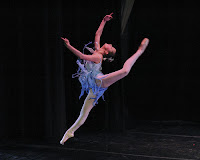 ge. It was very bad. It’s in my basement collecting spiders.
ge. It was very bad. It’s in my basement collecting spiders.
As a child what did you dream of becoming?
A ballerina!
What is your favourite scripture?
Zech. 4:6. This is my life lesson–that things are accomplished by God’s spirit, not by might or power. Wow, I just today needed to remember this! Why do I always forget this??
What are you most passionate about?
Food. Oh wait. I should say God. God, then food. And stories and writing. And getting out of our little boxes, seeing the world, and daring to examine things. The world is more multi-dimensional and varied and complex than we think. And God is infinitely more complex than we can comprehend. I think that’s why I like examining old beliefs with fresh eyes.
Could you share a little of your faith journey, please?
I became a believer at 11. It isn’t a very dramatic story–I just learned in Sunday school that I needed to understand I wasn’t good enough on my own, and that Jesus paid the cost for me. The journey has gotten interesting over the last few years, as God shows me that He is indeed the author of the unlikely, that grace is much more than I comprehended, and that legalism cannot be substituted for faith.
Relz Reviewz Extras
Review of Havah
Character spotlight on Havah and the adam

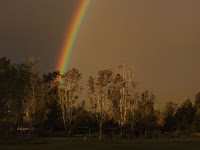
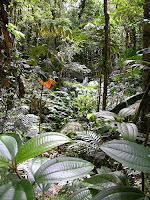
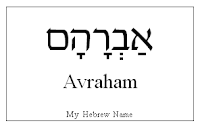
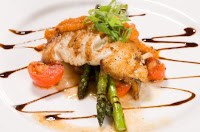




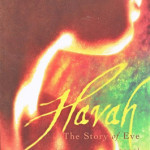
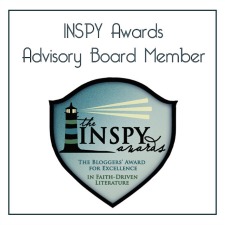




May 6, 2009 at 5:34 pm
Excellent interview and layout, looks really wonderful!
I am going to post a link to this on my blog!
I have had some contact with Tosca Lee and have read both of these books. I love it that she took a leap of faith in the Christian fiction world to write something different, not the girl meets boy, etc. kind of novels.
Thank you!
May 6, 2009 at 9:39 pm
WOW! What a great interview! Can’t wait to read the book!
May 9, 2009 at 3:30 am
I'm glad that Tosca wrote this book allowing her fantastic imagination & research, amazing grasp of the English language and willingness to present ideas on some details that we don't read about in the story of Eve. I can't wait to read her other books.